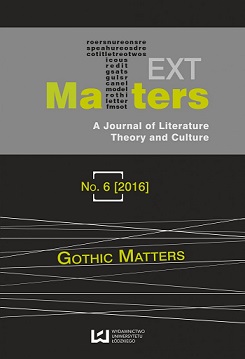Gothic Matters of De-Composition: The Pastoral Dead in Contemporary American Fiction
DOI:
https://doi.org/10.1515/texmat-2016-0008Abstract
In Alice Walker’s vignette “The Flowers,” a young black girl’s walk in the woods is interrupted when she treads “smack” into the skull of a lynched man. As her name predicates, Myop’s age and innocence obstruct her from seeing deeply into the full implications of the scene, while the more worldly reader is jarred and confronted with a whole history of racial violence and slavery. The skeleton, its teeth cracked and broken, is a temporal irruption, a Gothic “smack” that shatters the transience of the pastoral scene with the intrusion of a deeper past from which dead matter/material de-composes (disturbs, unsettles, undoes) the story’s present with the violent matter/issue of racism. Walker’s story is representative of an important trope in fiction, where the pastoral dead speak through the details of their remains, and the temporal fabric of text is disrupted by the very substance of death.
Against the backdrops of Terry Gifford’s post-pastoral and Fred Botting’s Gothic understanding of the literary corpse as “negative[ly] sublime,” this essay explores the fictional dead as matter unfettered by genre, consistently signifying beyond their own inanimate silences, revealing suppressed and unpalatable themes of racial and sexual violence, child abuse and cannibalistic consumerism. Along with Walker’s story, this study considers these ideas through new readings of Stephen King’s novella The Body, Raymond Carver’s story “So Much Water So Close to Home,” and The Road by Cormac McCarthy. While these writers may form an unlikely grouping in terms of style, each uses pastoral remains as significant material, deploying the dead as Gothic entities that force the reader to confront America’s darkest social and historical matters.
Downloads
References
Bartolovic, Crystal. “Consumerism, or the Cultural Logic of Late Cannibalism.” Cannibalism and Colonial World. Ed. Francis Barker, Peter Hulme and Margaret Iversen. Cambridge: Cambridge UP, 1998. 204–37. GoogleBooks. Web. 16 Apr. 2015.
Google Scholar
Bloom, Harold. Alice Walker. New York: Infobase, 2007. Print.
Google Scholar
Botting, Fred. Gothic. New York: Routledge, 2014. Kindle file.
Google Scholar
Bruhm, Steven. “The Contemporary Gothic: Why We Need It.” The Cambridge Companion to Gothic Fiction. Ed. Jerrold E. Hogle. Cambridge UP, 2009. 259–76. Cambridge Companions Online. Web. 30 Apr. 2015.
Google Scholar
Carver, Raymond. “So Much Water So Close to Home.” Fires: Essays, Poems, Stories. New York: Vintage Contemporaries, 1989. 185–204. Print.
Google Scholar
Gifford, Terry. “Cormac McCarthy’s The Road and a Post-Pastoral Theory of Fiction.” TerryGifford.co.uk. 2013. Web. 25 Apr. 2015.
Google Scholar
Gifford, Terry. Pastoral. Taylor & Francis e-Library, 2001. Kindle file.
Google Scholar
Hage, Erik. Cormac McCarthy: A Literary Companion. Jefferson, NC: MacFarland, 2010. GoogleBooks. Web. 25 Apr. 2015.
Google Scholar
Jindabyne. Dir. Ray Lawrence. Roadshow Films, 2006. DVD.
Google Scholar
King, Stephen. “The Body.” Different Seasons. London: Hodder, 2007. 383–582. Kindle file.
Google Scholar
Kolodny, Annette. The Lay of the Land: Metaphor as Experience and History in American Life and Letters. Chapel Hill: U of North Carolina P, 1984. GoogleBooks. Web. 19 Apr. 2015.
Google Scholar
Kristeva, Julia. The Powers of Horror: An Essay on Abjection. Trans. Leon S. Roudiez. New York: Columbia UP, 1980. GoogleBooks. Web. 19 Apr. 2015.
Google Scholar
Lainsbury, G.P. The Carver Chronotope: Contextualizing Raymond Carver. New York: Routledge, 2004. GoogleBooks. Web. 18 Apr. 2015.
Google Scholar
Marx, Leo. The Machine in the Garden: Technology and the Pastoral Ideal in America. New York: Oxford UP, 2000. Kindle file.
Google Scholar
McCarthy, Cormac. The Road. New York: Picador, 2010. Kindle file.
Google Scholar
Meeropol, Abel. “Strange Fruit.” Perf. Billie Holiday. Verve, 2003. MP3.
Google Scholar
Oswald, Dana. “Monstrous Gender: Geographies of Ambiguity.” The Ashgate Research Companion to Monsters and the Monstrous. Ed. Asa Simon Mittman with Peter J. Dendle. Farnham: Ashgate, 2012. 343–64. GoogleBooks. Web. 16 Apr. 2015.
Google Scholar
The Road. Dir. John Hillcote. Weinstein, 2009. DVD.
Google Scholar
Sanghani, Radhika. “Teenage Boys Addicted to ‘Extreme’ Porn and Want Help.” The Telegraph. The Telegraph 30 Sep. 2013. Web. 14 Apr. 2015.
Google Scholar
Sears, John. Stephen King’s Gothic. Cardiff: U of Wales P, 2011. GoogleBooks. Web. 16 Apr. 2015.
Google Scholar
Stave, Shirley A. Gloria Naylor: Strategy, Technique, Magic and Myth. London: Associated UP, 2001. Print.
Google Scholar
Walker, Alice. “The Flowers.” Sudden Fiction (Continued). Ed. Robert Shapard and James Thomas. New York: Norton, 1996. Print.
Google Scholar
Downloads
Published
How to Cite
Issue
Section
License

This work is licensed under a Creative Commons Attribution-NonCommercial-NoDerivatives 4.0 International License.













